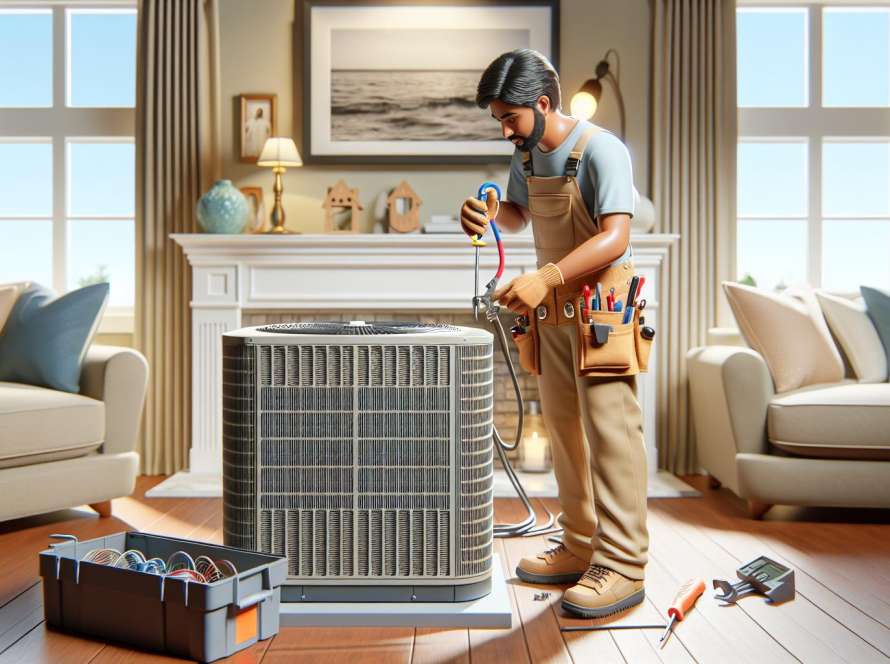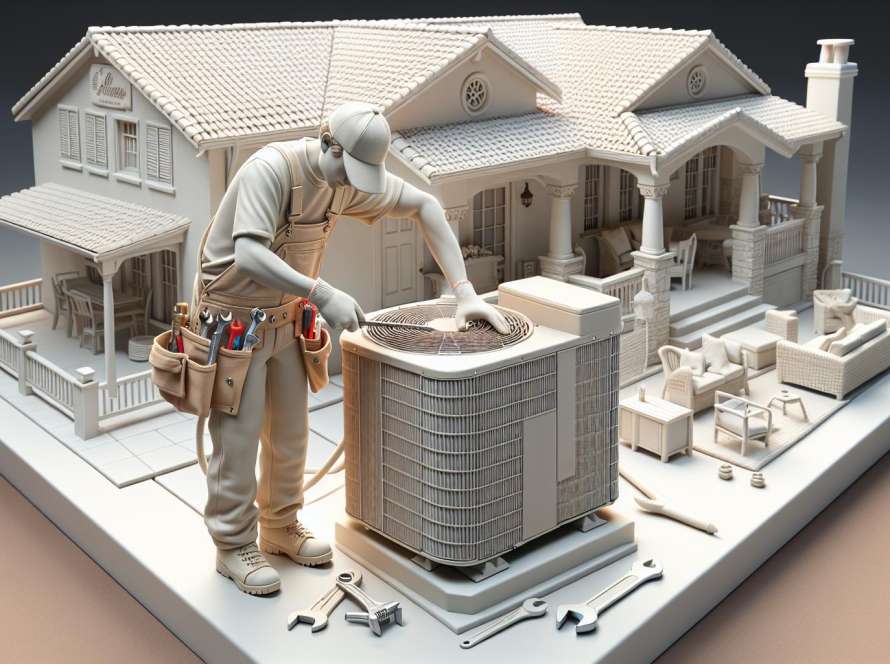Living in Florida means dealing with heat and humidity year-round. Our air conditioning units work overtime to keep us comfortable, making it crucial to maintain their performance. Neglecting AC maintenance can lead to costly repairs and decreased efficiency, especially in a climate like Florida’s.
Regular maintenance not only ensures that our AC units operate efficiently but also extends their lifespan. From changing filters to cleaning coils, there are simple tasks we can do to prevent breakdowns and keep our AC running smoothly. With the right maintenance routine, we can stay cool and comfortable even during the hottest Florida days.
Importance of Regular Maintenance
When it comes to maintaining AC performance in the Florida climate, regular maintenance is key. Here’s why:
For Beginners: Mastering the Basics
- Changing air filters regularly ensures proper airflow and keeps your AC unit running efficiently.
- Cleaning the outdoor unit helps prevent debris buildup and maintains optimal performance.
- Checking for leaks in the ductwork can improve airflow and reduce energy consumption.
For Intermediate Users: Enhancing Your Maintenance Routine
- Scheduling annual professional inspections can catch small issues before they escalate.
- Cleaning evaporator and condenser coils helps the system run smoothly and efficiently.
- Inspecting thermostat settings ensures your AC is cooling your space effectively.
- Sealing duct leaks can improve energy efficiency and reduce utility bills.
- Installing a programmable thermostat allows for customized cooling schedules and energy savings.
- Investing in regular HVAC tune-ups can prolong the lifespan of your AC unit.
Remember, regular maintenance is essential to keep your AC unit running smoothly, efficiently, and effectively in the Florida climate.
Common AC Issues in Florida Climate

For Beginners: Identifying Basic Problems
- Clogged Air Filters: Check and replace air filters regularly to ensure proper airflow.
- Thermostat Malfunctions: Ensure the thermostat is set correctly and consider upgrading to a programmable one.
- Refrigerant Leaks: Look for signs of refrigerant leaks such as reduced cooling capacity and higher electricity bills.
For Intermediate Users: Addressing More Complex Challenges
- Condensate Drain Line Clogs: Regularly inspect and clean the condensate drain line to prevent water damage.
- Frozen Evaporator Coils: If you notice ice buildup on the coils, turn off the system and consult a professional.
- Uneven Cooling: Check for obstructions around vents and consider installing zone control systems for better temperature regulation.
- Compressor Issues: Monitor compressor performance and consider professional maintenance if you suspect problems.
- Electrical Component Failures: Inspect and replace faulty electrical components like capacitors or contactors.
- Ductwork Leaks: Conduct a thorough inspection of ductwork for leaks and seal them to improve efficiency.
| AC Issue | Importance |
|---|---|
| Clogged Air Filters | High |
| Refrigerant Leaks | Medium |
| Frozen Evaporator Coils | High |
| Compressor Issues | High |
| Ductwork Leaks | Medium |
Tips for Maintaining AC Performance
For Beginners: Getting Started on AC Maintenance
- Change air filters regularly to ensure proper airflow.
- Check thermostat settings to avoid overworking the system.
- Inspect for leaks to prevent refrigerant loss.
- Clear debris around the outdoor unit for optimal performance.
- Schedule annual professional maintenance for expert care.
For Intermediate Users: Enhancing AC Efficiency
- Address condensate drain line clogs promptly to prevent water damage.
- Deice frozen evaporator coils to restore cooling efficiency.
- Balance cooling with zoning to ensure consistent temperatures.
- Handle compressor issues by monitoring for unusual sounds or vibrations.
- Seal ductwork leaks to enhance airflow and reduce energy waste.
- Troubleshoot electrical component failures with caution and expertise.
- Optimize refrigerant levels for peak system performance.
- Consider upgrading to a programmable thermostat for better control.
- Ensure proper insulation in ductwork to prevent energy loss.
- Monitor air quality and consider UV lights for improved indoor air freshness.
| Maintenance Task | Frequency |
|---|---|
| Change air filters | Every 1-3 months |
| Schedule professional maintenance | Annually |
| Clear debris around unit | Regularly |
| Address condensate drain line clogs | As needed |
| Deice frozen evaporator coils | Seasonally |
| Seal ductwork leaks | When detected |
Professional Maintenance vs. DIY
When it comes to maintaining optimal performance of your air conditioning unit in Florida, the choice between professional maintenance and DIY tasks can be crucial. Here’s a breakdown based on different experience levels:
For Beginners: Getting Started Right
- Changing Air Filters Regularly: A simple task that can significantly impact AC efficiency.
- Checking Thermostat Settings: Ensure it’s set at the right temperature for comfort and energy savings.
- Inspecting for Leaks: Look for any visible leaks around the unit to prevent cooling inefficiencies.
- Clearing Debris Around Outdoor Unit: Keep the area around the outdoor unit clean to avoid airflow obstructions.
- Scheduling Annual Professional Maintenance: An essential step to catch potential issues early on.
For Intermediate Users: Taking It Up a Notch
- Addressing Condensate Drain Line Clogs: Prevent water damage and mold growth by clearing these clogs.
- Deicing Frozen Evaporator Coils: Safely defrost the coils to maintain proper airflow.
- Balancing Cooling with Zoning: Control temperatures in different areas of your home efficiently.
- Handling Compressor Issues: Troubleshoot and address common compressor problems promptly.
- Sealing Ductwork Leaks: Enhance energy efficiency by sealing any leaks in your ductwork.
- Troubleshooting Electrical Component Failures: Safety first – address electrical issues with caution.
- Optimizing Refrigerant Levels: Ensure proper refrigerant levels for peak AC performance.
- Consider Upgrading to a Programmable Thermostat: Enhance control and energy efficiency with this upgrade.
- Ensuring Proper Insulation in Ductwork: Keep cool air from escaping with well-insulated ducts.
- Monitoring Air Quality: Implement air quality solutions to enhance indoor comfort.
- Optimizing System Efficiency: Fine-tune your AC system for maximum efficiency and cost savings.
Remember, whether you choose professional maintenance or DIY tasks, regular attention to your air conditioning unit is key to enjoying a cool and comfortable indoor environment in Florida.
Maximizing AC Efficiency in Florida

For Beginners: Quick and Easy Maintenance Tips
- Change Air Filters Regularly: Keep the air clean and flowing smoothly by changing filters every 1 to 3 months.
- Check Thermostat Settings: Ensure the temperature is set correctly for comfort and efficiency.
- Inspect for Leaks: Look for any visible leaks in the system to prevent energy waste.
- Clear Debris Around the Unit: Remove any debris like leaves or branches to prevent airflow blockages.
- Schedule Professional Maintenance: Get a professional tune-up annually to keep your AC running smoothly.
For Intermediate Users: Taking Maintenance a Step Further
- Address Condensate Drain Line Clogs: Clear any clogs to prevent water damage and mold growth.
- Deice Coils: If you notice ice buildup, turn off the AC and let it thaw before restarting.
- Balance Cooling with Zoning: Optimize cooling by adjusting airflow to different areas of your home.
- Handle Compressor Issues: Keep an eye out for unusual noises and ensure the compressor is functioning well.
- Seal Ductwork Leaks: Prevent cool air from escaping by sealing any leaks in your ductwork.
- Optimize Refrigerant Levels: Ensure the correct level of refrigerant for efficient cooling.
- Upgrade to a Programmable Thermostat: Save energy by setting temperature schedules based on your routine.
- Ensure Duct Insulation: Properly insulate ducts to prevent energy loss and maintain consistent cooling.
- Monitor Air Quality: Keep indoor air clean by investing in air purifiers or regular ventilation.
- Troubleshoot Electrical Failures: Address electrical issues promptly to prevent AC malfunctions.
- Regularly Monitor Refrigerant Levels: Check refrigerant levels periodically and top up if needed.
| Statistics | |
|---|---|
| AC maintenance frequency | Every 1-3 months |
| Professional maintenance | Annually |
| Refrigerant level checks | Periodic checks |
| Ductwork leaks | Seal promptly to maximize efficiency |
Conclusion
Maintaining air conditioning units in Florida is crucial for optimal performance. By following the maintenance tips provided, we can ensure our AC systems work efficiently and effectively. From changing air filters to addressing condensate drain line clogs, each task plays a vital role in keeping our units running smoothly. Whether we are beginners or intermediate users, regular maintenance is key to creating a comfortable indoor environment in the Florida climate. By staying proactive and addressing issues promptly, we can enjoy cool and refreshing air year-round. Remember, a well-maintained AC not only enhances indoor comfort but also helps save on energy costs. Let’s prioritize AC maintenance to beat the heat and stay comfortable in Florida.

